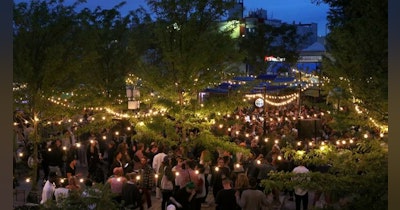It's fair to say I've been neglecting my blog, The BlogSledder. A combination of having limited time and a focus on more pressing priorities can be trotted out as my excuses, however strong or weak they may be.
Be that as it may, our current CenterPieceNY episode, a conversation with Corina Galvin (listen here) has reminded me once again of a strange region I once lived in, i.e. Single Channel Land, and I feel driven to write about it.
This little story is about television. It's also about the trauma of living a huge portion of my formative years in a region with one and only one single source of video content, a source which was extremely limited, to say the least.
When I say trauma I am only half-joking, because we humans, especially when we are young, crave stimulation through stories, both factual and fictitious. And the medium of video is the preferred way for most of us to consume a story. (Though, as an audiophile, with a podcast, I can tell you there are exceptions.)
It is also of note that this little story I am telling you harkens back to time when TV, and cinema, were the only two ways fresh video content was delivered. There were no smart phones, no computers. No Internet for the masses. Going to the cinema cost (a lot of) money, so TV was it, most of the time.
So what's all this then about something called Single Channel Land?
Allow me to explain.
Once upon a time, the Irish Republic was a significantly underdeveloped country. This stage in the history of the country spanned the period from the county's founding in the 1920s to the Celtic Tiger in the 1990s, give or take a couple of years.
Here's the relevant bit concerning television: up to late 1970s, the national TV broadcasting service of Ireland–broadcasting out of Dublin–had only one channel to offer its citizens. That service was, and still is, Raidió Teilifís Éireann, as named in Gaelic, or RTE for short. There were no other domestic, independent, television TV stations operating in the Irish Republic during that time, and there still isn't as far as I know.
But there were numerous TV stations transmitting from the UK and Northern Ireland, so the people of the Irish Republic had more channels to choose from than this single channel transmitting from Dublin.
Well, not all the people.
Remember again, this was before cable TV, and certainly before streaming. You got your TV programs/programmes by sticking an aerial on the roof of your home, which then 'caught' TV signals coming by in the air around you, and which then sent all that analog stimuli along a stretch of wire to the cathode ray tube in your telly, to render sound and vision for your entertainment and edification. (I probably wasn't the greatest of engineers so this is how I think of it, at least.) This all seems so quaint now, but that's how it worked. Actually, a bit like WiFi, which is digital, when you think about it, yeah?
Unfortunately, due to the laws of physics, the broadcast signals coming from the UK and Northern Ireland petered out in the Irish midlands, which then left a large swath of the country with only RTE's single channel to watch.
Hence the term: Single Channel Land. This graphic I put together demonstrates the issue.
And not only was a large section of the Irish population left with no other option each evening but to sit down for an experience of content without choice, that content, more often than not, was awful. Inexplicably, some of this terrible content included weird cartoons from Soviet era Czechoslovakia. (You had to be there...)
And, I kid you not, sometimes this mickey-mouse TV station was on the air for a mere five or six hours a day!
For a country saturated with rain, and more so in the West, it was a cruel deprivation for children and youth, who were too young to frequent pubs–very much the center of everything in the Ireland of its time. Sitting at home listening to rain lashing against your house was a common activity for the young.
Possibly to stave off agrarian peasant revolt, RTE did make an effort, albeit a half-assed one, to ease the plight of its citizens in Single Channel Land. It bought shows and movies from the US, along with the UK, usually long after they first aired in their countries of origin, and thus, I guess, were sold to RTE at bargain-basement prices. This resulted in a hodge-podge of shows from the States, from England, and sometimes even Australia, now that I think about it, along with home grown productions.
If you ever got into conversation with an American or an English person, you were able to talk about shows you both knew (e.g. Hawaii Five-0, Magic Roundabout) but not others (e.g. Starskey and Hutch, The Two Ronnies). You often had to admit: "Oh no, we didn't have that one." You felt half-informed, half-sophisticated, stuck on the wrong side of some 'cool' divide. We were the poor country mice.
In fairness, a few things RTE produced themselves were good. The Late Late Show was one such, hosted by the great Gay Byrne. and for the kids (me) there was the excellent, imaginative Wanderly Wagon, to name just a couple. And the annual Late Late Toy Show at Christmas is watched with great interest all throughout the diaspora on the Internet to this day.
RTE brought in a second channel in 1978, which improved matters considerably, but without the numerous channels available to those closer to England, it still felt like a single channel place.
During these years, I happened to be growing up in Galway City, slap bang in the heart of Single Channel Land, so I keenly felt I was living in a content desert. I suppose if I didn't know any better I would have been happy, because comparison is the thief of joy, as they say.
But I couldn't help but compare my situation to the luckier Irish on the other side of our island nation, towards the East and Dublin.
This esteem-shattering comparison was readily visible in the national newspapers, where the program schedules for the many channels available to our betters living nearer the UK, were published daily. I would pore over the listings, imaging how wonderful all the shows I'd never see were.
There was one particularly painful incidence of exclusion that stands out in my mind. As those who know me well will be aware, I really only care about one sport, and that's football, the type Messi plays. Yes, I am referring to soccer. I have a passing interest in other sports like Gaelic football, hurling, baseball, rugby etc., but really the only one I follow religiously is (soccer) football. And especially English football. I've been a Chelsea fan since I was nine, and back then Chelsea were in the second division of the English leagues, not the major force they are today. So I've put in the time with my likely lads in blue.
My other favorite team is the Republic of Ireland's international team.
In the late 1970s I followed Arsenal's progress closely. Why? Because in their team they had three of the finest Irishmen to ever play the game, three players that were the backbone of a powerful Arsenal side: David O'Leary, Liam Brady and Frank Stapleton.
This trio made us extremely proud in Ireland. Even the English heaped praise on them for their abilities.
On the 10th of May 1980, Arsenal played West Ham in the FA Cup final–a hugely prestigious competition. I looked forward to watching this game, and my Irish heroes playing for Arsenal, with great excitement and anticipation. I parked myself in front of the TV at kickoff, only to find out that RTE workers had gone on strike and would not be carrying the game.
Through my tears, I thought of all those living in Multi-Channel Land who were happily watching the game on a channel broadcasting from across the Irish Sea. I felt we in the West were seen as second class citizens. RTE workers could go on strike and the people around them in Dublin hardly cared. Had they been in Galway that day they would have been subject to some choice words, and even the thump of a fist or two!
It was easy to forget us, on the less relevant side of what was, for all intents and purpose those days, a third world country.
What is also interesting about this incident is that evidence of it happening at all is almost non-existent. It's as if RTE is guilty of a big cover-up!
I did find this comment though, buried deep in some story about great football games watched on TV.
Jason, like me, feels the sting of that day still!
Here's something else I found which makes reference to this 'stolen' FA Cup Final, but, be warned, there is bad language in this video.
And that's about all the evidence I can unearth about this atrocity.
But it happened, I assure you.
Here's a good Irish Times article about Single Channel Land. Author Karl McDermott is described as a Single Channel Land survivor.
Such is the trauma. I too am a survivor.
Paul Finnegan
Creator, Producer and Host of CenterPieceNY
Comments/feedback on this blog post are welcome.
PS: To compound the situation, Arsenal lost the game against West Ham that day. I attribute this to the fact that I was unable to will them to victory from my armchair. It was many years before I got to see Trevor Brooking's winning goal on YouTube. Feel free to look that one up yourself, since I don't feel compelled to make that easy for you by providing you a link to it. I'm sure you understand.








